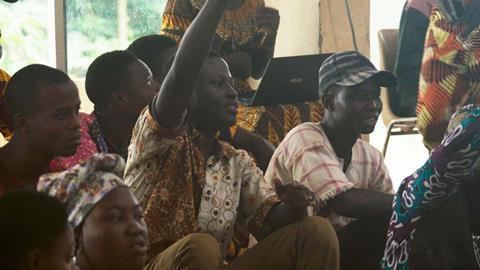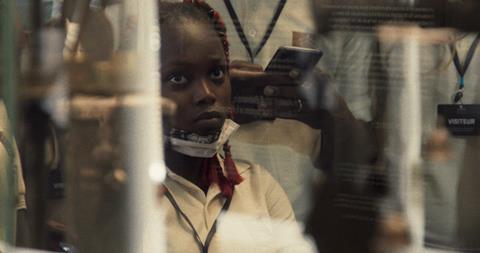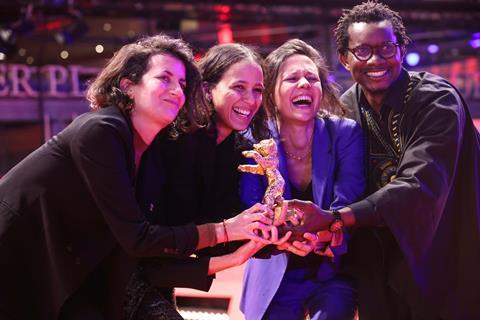French-Senegalese director Mati Diop talks to Screen about unpacking a heavy history of colonialism with her genre-defying hybrid documentary Dahomey.

In her Berlinale Golden Bear winner Dahomey, French-Senegalese filmmaker Mati Diop charts the return of 26 artefacts looted from the African kingdom of Dahomey as they make their way back from Paris’s Musée du quai Branly - Jacques Chirac to what is now Benin.
Blurring non-fiction and fantasy and raising political and philosophical questions about cultural colonialism, Diop presents footage of treasures pillaged in 1892 by French troops as they are packed up for repatriation, juxtaposed with scenes of Benin’s University of Abomey-Calavi students debating what the return of the artefacts means to them. It is narrated in the hypnotic voice of a wooden statue of King Ghezo of Dahomey, known simply as ‘26’. The words are spoken in Fon, an Indigenous language replaced with French during colonisation, by Haitian writer Makenzy Orcel — all with a spooky electronic score from Wally Badarou and Dean Blunt.
Diop, however, describes the unconventional approach in more terse terms: “I’m a filmmaker. It’s a film. It’s as simple as that.” The 68-minute feature is the multi-faceted artist’s follow-up to 2019 debut Atlantics, a drama about clandestine immigration told as a contemporary ghost story, which won the grand prix at Cannes after its world premiere in Competition. Dahomey is an Oscar contender for documentary feature and Senegal’s pick for international feature, but it does not fit seamlessly into either category.
“All of my films are very hybrid,” Diop says of both Atlantics and her shorts such as 2011’s French Alps-set Snow Canon or 2013’s Dakar-set A Thousand Suns about 1973 cult movie Touki Bouki, which was directed by her uncle, acclaimed Senegalese filmmaker Djibril Diop Mambéty. “They are uncategorisable, but they are all works of cinema.”
On suggesting that “I don’t think Dahomey is a documentary at all”, she then qualifies, “I accept it is categorised as such from an industry standpoint.”
Common history

Like the artefacts that originated in Africa but spent years in France, Dahomey is a melange of cultural identities. It is produced by Diop’s own Dakar-based company Fanta Sy (launched with Senegalese industry veteran Fabacary Assymby Coly), alongside Atlantics producers Eve Robin and Judith Lou Lévy’s Paris-based Les Films du Bal.
“It is limiting that it can only represent one country,” says Diop, but whatever form it takes, she calls the film’s inclusion in the awards season “a way to assure a common history between France, Senegal and Benin. My ambition is to make sure African cinema exists within global cinema.”
The filmmaker is as unclassifiable as her art. Born in Paris to a French mother and a Senegalese father, she juggles a parallel career acting in films such as Claire Denis’ 35 Shots Of Rum. “My profile is atypical,” says Diop. “I represent something and someone elusive, as a mixed-race artist who makes hybrid films. I direct films, I now produce, I’ve also been acting, I’m from a cinema family but I’m also not a ‘fille de…’ [French phrase for nepo baby]. I’m on the border of many different things at once, and in France it is complicated to process all of these different layers.”
Her reception in the US has been particularly welcoming. “In America, I feel there is more flexibility, more fluidity. You’re first considered a filmmaker before anything else.”
With Dahomey, Diop says she originally envisioned a fiction feature that took on a form of its own based on current events. “I first had the idea for a film about a fictional African mask that tells its own story with its own words in the first person from pillage to repatriation after a long exile in Europe,” she explains.
In 2021, Diop learned that the 26 artefacts, among thousands that had been taken during colonisation, would be repatriated — an act of restitution sanctioned by France’s president Emmanuel Macron.
“I knew I had to document it,” she says, even though the objects were due to leave Paris in only a fortnight. “In two weeks, I had to find the vision of the film and create the conditions for a film shoot.” She hopped on board as a producer, found a crew, asked for government authorisation to shoot the entire process and set the wheels in motion.
“I think sometimes a film chooses us. I’d had the fiction about the African mask in my head for years, so that allowed me to quickly establish how I would direct it,” says Diop of a process that was as hybrid as the film itself. “The writing and the mise‑en-scène became one.” She credits her “incredible team” and cinematographer Joséphine Drouin-Viallard for shooting early scenes of the treasures arriving in Cotonou, Benin since she was not able to join them until days later.
World tour

After its big win in Berlin, Dahomey has toured the global festival circuit with stops at Toronto, New York, London, Chicago, AFI Fest and International Documentary Film Festival Amsterdam, among others. Les Films du Losange has sold it widely, including to Mubi for North America, the UK and Ireland, and a slew of other territories.
Dahomey was first released in Benin and Senegal, a distribution strategy that was important for Diop. “We always think of Africa as peripheral, so it was a conscious choice to release it there first,” she says. “In Senegal, the film has had a very strong response.” Its impact in Benin has been more difficult to assess: “Freedom of speech is more difficult there.”
Diop has travelled with Dahomey to places where “I’ve felt something strong happening beyond the film itself”, sparking debate and dialogue both in person and on social media. “The spectator has a big role in the film,” she adds. “It isn’t meant to point any fingers or infantilise.” Instead, she explains, the film is a window: “It allows audiences to enter into the complexities of colonial history and reflection and responsibility, and ask, ‘Should I continue to close my eyes or stare it in the face?’”
Her open approach invites viewers to draw their own conclusions. “Audiences are intelligent enough to understand that it is a cinema experience that transcends categories and to have an immersive experience. Documentaries don’t need to be didactic.”
While never imposing her own viewpoint, Diop says Dahomey is anything but neutral. “It is a radically political film about works torn from their homeland, African youth deprived of their cultural heritage,” giving the objects a voice and specifically one in the marginalised language of Fon. “It’s political because it transcends the conventions of format. It’s political, because it’s totally free.”
When Atlantics premiered in Cannes in 2019, Diop was hailed as being the first Black female filmmaker in Competition, a label she describes as “limiting, lacking modernity and somewhat racist”. Instead, she hopes its inclusion and the fact Dahomey has resonated with audiences across the globe will make such classifications obsolete in the future. “It symbolises the emergence of a new generation of filmmakers, a new wave of a certain African cinema, of French cinema, a bridge between Africa and France.
“I think we are changing cinema, we’re changing the game. France is us, we are France.”
























No comments yet